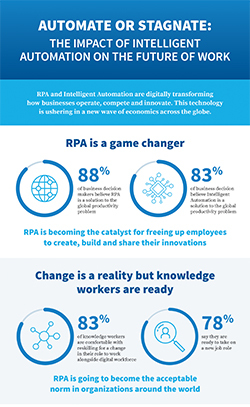A new wave of economics is emerging across the globe, driven by the rapid convergence of automation and Artificial Intelligence (AI). It is transforming how organizations view themselves. It is forever changing how the employees that drive businesses live and work. It is connecting talented people with the opportunity to create and innovate with unprecedented speed. This is the power of connected- Robotic Process Automation (RPA) and it is pivotal to how organizations will survive and thrive in the global economy.

This sea change in the way we work runs far deeper than just speeding up processes. This is about the first revolution to place the human at the heart of the creative value chain. At a time when the developed global economies are facing multiple challenges to productivity, tapping into the latent potential of humans is critical to reversing this trend.
Businesses across the globe have to contend with growing customer demands, aging populations and skills gaps, amongst other pressing concerns. Technology can provide many of the answers to these problems, but left to its own devices its transformational impact will be limited. Businesses have to match the latest tech with a new way of thinking if they are to take on the challenges we now face.
The critical nature of the challenge is why we decided to investigate how businesses around the world are using technology to transform economic output. We focused on four key areas to develop a roadmap for success:
- To what extent RPA and automation, in general, is understood and applied effectively
- What impact the technology could have on the global economy
- What employees think of the rise of the digital workforce
- The competing views of business leaders and their teams regarding RPA
The study found that business decision makers around the world are hugely confident that they have a strong understanding of RPA and are harnessing it effectively within their respective organizations. This level of confidence, however, is not shared by the knowledge workers in their teams who are keeping the organizations running. While opinions differ on some elements of the equation such as this, there is greater clarity in others. RPA adoption is moving forward at great pace and the technology is widely regarded as essential to improving economic output.
These disparities and similarities have been mapped across businesses in key global markets, from the UK to the US, France to Germany and Japan to Australia. It is the disparities though, between business leaders and their employees, that is where we should pay the most attention. If a new wave of economics is truly to be ushered in, the gaps in understanding, application and perception have to be closed. The results show that we are just scratching at the surface of the potential that rests within our organizations; now it’s time to dig a little deeper.
This fourth paper from Knowledge Capital Partners (KCP) analyzes how customers can address the key RPA challenges of changing people, process and technology. Change management is never easy and as companies have learned, sometimes painfully, technology by itself is never a panacea. This paper highlights the major risks organizations face as they introduce RPA and how they can be averted. Key learning include;
The Latest From SS&C Blue Prism
ご利用のネットワークにおいてYouTubeがブロックされている場合、このウェブページの動画が適切に表示されない場合があります。その場合は、別のネットワークに切り替えてください。動画を再生すると、サードパーティであるYouTubeのCookieが設定されます。詳しくはCookieポリシーをご確認ください。
